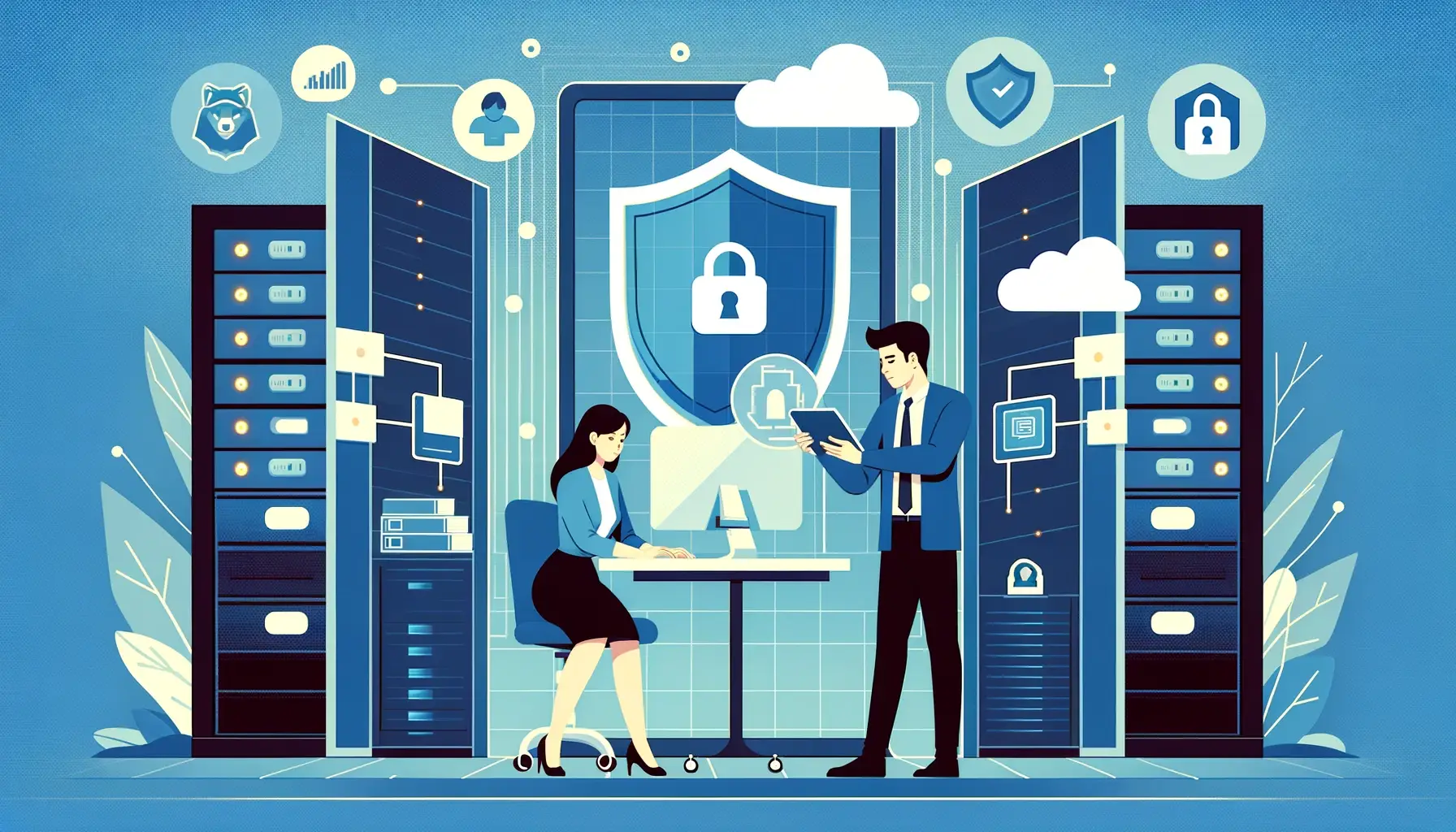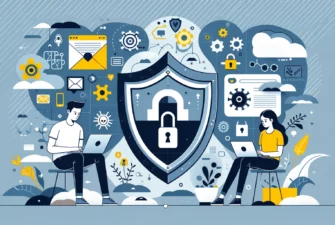
VPN and HTTPS are two important technologies for online protection. Many users ask which one is better, but comparing them is like comparing apples to oranges. Both are great tools to use but for different reasons. Best of all, they complement each other, so you can use both for a better browsing experience on the Internet. Stay with us for the ultimate HTTPS vs VPN comparison.
Table of Contents
- What Is a VPN and How Does It Work?
- The Pros and Cons of a VPN
- What Is HTTPS and How Does It Work?
- What Are the Things That HTTPS Cannot Accomplish?
- When Is HTTPS Sufficient, and When Should I Consider Using a VPN?
What Is a VPN and How Does It Work?
VPN stands for Virtual Private Network, a service that protects your identity and data when you browse the web. VPN acts as a tunnel between your devices such as PC, tablets, and mobile phones, and an unsecured network like the Internet. To establish an encrypted connection between you and the Web, all you have to do is download a VPN client from a trusted provider and install it on your machine.
With a commercial VPN provider, you can connect to a wide range of servers from every corner of the world, and not even your ISP (Internet Service Provider) can track the traffic and data traveling between your device and the server. On top of that, your real IP address is masked with another one corresponding to the server’s location of your choice. For instance, you browse from the USA, but with a VPN you appear as if you’re from a different country.
The Pros and Cons of a VPN
A VPN offers plenty of benefits, but it doesn’t mean you should always use it. Below we’ve listed a few pros and cons to help you understand better when you may need a VPN service.
Pros:
- VPNs hide your online identity. Nowadays, everyone and their dog can monitor their online activity. From your ISP and government surveillance agencies to advertisers and amateur hackers, everyone can see your browsing history and invade your online privacy. Here’s where a VPN steps in and protects your confidentiality. By hiding your IP address and encrypting the online traffic, a VPN makes you vanish from the trackers’ radar. Neither your ISP nor Google or other ad services will be able to observe your online movements.
- VPNs bypass geo-restrictions. How many times you’ve wanted to watch a movie or listen to a song, only to find out that they are blocked in your country? It’s not your fault you can access your favorite TV show, but content creators aren’t responsible for these restrictions. All they do is follow the copyright rules and licensing regulations. Websites enable geo-blocking by seeing your IP address, which is allocated to your country or region. Since a VPN hides the IP address, you can connect to a location where it’s available and enjoy it as if you were from that area.
- VPNs bypass firewalls and secure your online connection. VPNs are handy when you’re traveling abroad or working remotely. In some countries like China, where government-enforced firewalls block popular sites such as Facebook, Twitter, and Instagram, a VPN is the only way to access them. Likewise, if you need to use a free WiFi connection for work or shopping, a VPN will encrypt your credit card details and login credentials from cyber-attackers.
Cons:
- VPNs can reduce your online speed. Your Internet connection speed may be unstable when you use a VPN. A common reason is the distance from your physical location to the remote server you want to connect. For instance, if you’re in the UK and connect to a server in New Zealand, which is thousands of miles away, the speed will slow down, and your videos may buffer.
- Free VPNs can endanger your privacy. Free is always tempting but seldom reliable. A dodgy VPN service can do you more harm than good. If it doesn’t follow the latest VPN protocols and encryption, your credentials may be vulnerable to cyber-thieves. Even worse, a free VPN might even inject malware into your system.
- Some platforms don’t inherently support VPNs. You shouldn’t have a problem installing a VPN service on popular platforms such as Windows, macOS, Android, and iOS. However, on some devices and operating systems such as Chromebook and Linux, you’ll have to manually configure a VPN connection.
Now that you know what a VPN is, let’s refresh our memories about what HTTPS is and does.
What Is HTTPS and How Does It Work?
HTTPS (HyperText Transfer Protocol Secure) is the secure version of HTTP, a protocol used to transfer data over the web. HTTPS is also known as HTTP over TLS (Transport Layer Security), or HTTP over SSL (Secure Sockets Layer). TLS/SSL is a cryptographic protocol designed to encrypt sensitive data in transit between two computer applications over a network.
HTTP is the underlying protocol of the World Wide Web. It defines how browsers and servers should act in response to various commands. While HTTP is essential to how the Internet functions, it has one huge weakness: all data transferred via HTTP remains in plain text and becomes susceptible to man-in-the-middle attacks. That’s why all websites today should use the secure HTTPS protocol where TLS encryption is impossible to crack by hackers.
For website owners, protecting sensitive data is of paramount importance. If users’ connection is not over the HTTPS protocol, browsers will issue an off-putting security warning, marking your site as “Not Secure.”
To enable HTTPS, you must install an SSL certificate on your website’s server. SSL certificates are small digital files that verify and confirm your website or company’s identity and encrypt visitors’ shared information.
As a visitor, you should share your private details such as login credentials and credit card numbers only on HTTPS sites. How do you know a site is encrypted? The padlock icon next to the URL is the best indicator. You can click it and read more about the certificate type and issuer.
We’ve already written about the benefits of HTTPS and SSL certificates.
What Are the Things That HTTPS Cannot Accomplish?
While HTTPS ensures the confidentiality of web communications, it doesn’t provide full-fledged protection against all threats. It’s part of the overall security architecture that keeps hackers away from websites.
Here’s what HTTPS encryption can’t accomplish:
- It can’t protect against attacks that exploit vulnerabilities in the web application itself. HTTPS can encrypt data in transit, but it can’t prevent an attacker from finding a loophole in the website’s code to gain unauthorized access or steal data from the server.
- It can’t prevent phishing attacks. HTTPS encrypts the data transmitted between the user and the server, but it can’t stop a user from voluntarily providing sensitive information to an attacker. The best antidote for phishing is increased cyber-security awareness.
- HTTPS can’t block attacks on the client side of the connection. It can’t prevent an attacker from compromising the client device or intercepting data before it is encrypted.
- HTTPS encryption alone can’t guarantee the website’s authenticity. Free and Domain Validation SSL certificates that use the HTTPS protocol verify domain ownership. Only Business SSL certs and Extended Validation SSL certs can validate the company’s identity and confirm that it’s genuine.
When Is HTTPS Sufficient, and When Should I Consider Using a VPN?
By now, you should understand better VPNs and HTTPS. Let’s wrap up the differences and similarities, so you know exactly where and when to use them.
HTTPS vs VPN – Differences and Similarities
- Both VPN and HTTPS encrypt communications, but while VPN does it for your entire device, HTTPS only protects the connection between your browser and the website’s server.
- A VPN hides your identity and browsing activity from ISP, surveilling agencies, and hackers, while HTTPS encodes sensitive information you submit on websites.
- Unlike a VPN, you don’t have direct control over HTTPS, since the SSL certificate is managed by the website owner.
- Neither HTTPS nor VPNs will protect your device from malware or scams. You should apply common sense and caution when using suspicious websites or services.
Conclusion
In conclusion, VPNs are third-party software that protects Internet privacy, while HTTPS is a protocol that secures communications over the Web. You don’t need a VPN to use HTTPS and vice versa, but you can use both technologies at the same time to accomplish different goals. You can access an HTTPS website from a remote VPN server to securely buy a service that is restricted in your country. That’s the beauty of modern technology and it concludes our in-depth VPN versus HTTPS analysis.
Save 10% on SSL Certificates when ordering today!
Fast issuance, strong encryption, 99.99% browser trust, dedicated support, and 25-day money-back guarantee. Coupon code: SAVE10

























